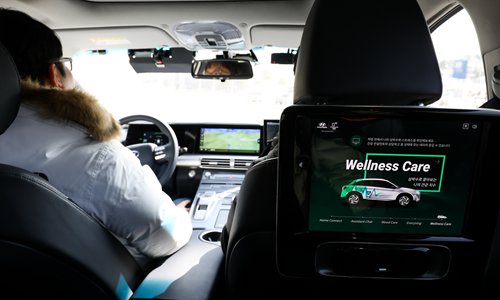HOME >> BUSINESS
Hyundai is a dark horse in the driverless car race that has yet to truly get going
Source:Global Times Published: 2019/10/23 20:38:41

A touch screen is displayed inside a Hyundai Nexo autonomous fuel cell electric vehicle during a test drive in South Korea in February 2018. Photo: VCG
Hyundai is zooming onto the self-driving scene. Following the leads of General Motors, Uber, Apple and the like, the South Korean carmaker just unveiled bold plans to invest in autonomous vehicles and other related systems. Despite the late start, well-chosen partners and support from Seoul give it a fighting chance.
The race for dominance is well under way. Alphabet's Waymo and GM Cruise, backed by SoftBank Group's $100 billion Vision Fund, already clocked up more than 25,000 kilometers of hands-free rides last year, according to a 2018 report by a California government agency.
Catching up won't be easy. Unlisted parent company Hyundai Motor Group, effectively led by Executive Vice Chairman Euisun Chung, said recently that it would plough some $35 billion into developing new technologies through 2025. It optimistically plans to offer fully autonomous driving systems to taxi fleets and rival automakers in three years.
There is understandable skepticism. Hyundai Motor Co shares hardly budged after the announcement. The $26 billion company is already grappling with costly recalls and sluggish sales in its largest market, China. It also has a weak track record in new discoveries: last year, it spent less than 3 percent of revenue on R&D, compared with nearly 7 percent at Germany's Volkswagen.
Hyundai is shrewdly enlisting outside help. It recently announced a $1.6 billion investment - the group's biggest one overseas - into a joint venture with Aptiv, a parts supplier and pioneer in self-driving cars. Closer to home, there is potential to cooperate with local peers; only Japan boasts more driverless tech patents per capita, according to KPMG. One possibility might be Samsung, which is also developing next-generation wireless communications and software.
National champion status should help Hyundai, too. President Moon Jae-in's government has vowed to provide systems and infrastructure to support completely driverless cars by 2024. It is offering an entire city for test drives, and the country's mobile network is among the most robust in the world - 4G coverage reaches 96 percent of the population.
What's more, Hyundai has time on its side. Driverless technology is new enough that no one can claim a decisive lead. There's room yet for a dark horse.
The authors are Katrina Hamlin and Robyn Mak, Reuters Breakingviews columnists. The article was first published on Reuters Breakingviews. bizopinion@globaltimes.com.cn
Posted in: INSIDER'S EYE